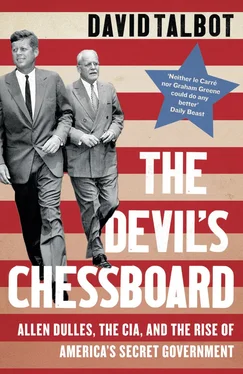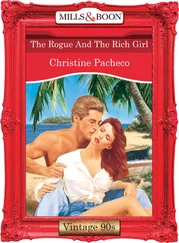Nixon knew that it would take a large campaign war chest to defeat the five-term Voorhis—and he also made clear that he was not interested in running for office if it meant taking a pay cut. Republican business circles in New York and Los Angeles quickly rallied to make the campaign against Voorhis worth the effort of their candidate. An executive for Gladding, McBean, a major ceramics manufacturer whose chairman sat on Standard Oil’s board, later recalled how the corporate message on behalf of Nixon was delivered. At a meeting of seventy-five executives held at an exclusive Ojai, California, resort, the president of Gladding, McBean touted the “ young man fresh out of the Navy” who had been lined up for the congressional race. “Smart as all get out. Just what we need to get rid of Jerry Voorhis … He says he can’t live on a congressman’s salary. Needs a lot more than that to match what he knows he could make in private law practice. The boys need cash to make up the difference. We’re going to help.”
Gladding, McBean became a key generator of cash for Nixon, shaking down its own executives for campaign contributions and spreading the word to other corporate donors. The company president demanded that his fellow executives deliver the money in cash to his office. “We just gotta get rid of that pinko Voorhis,” he exhorted his team. The strong-arm appeal worked. Gladding, McBean alone raised at least $5,000 from its executive ranks, the equivalent of over $65,000 today. Together, Nixon’s corporate backers amassed a campaign “pot big enough to engulf the world,” as the Gladding, McBean financial officer later put it.
Gladding, McBean had a modest enough corporate profile to escape the scrutiny of election officials, but its board of directors boasted a variety of high-profile connections in the political and financial worlds. One director, Los Angeles corporate attorney Herman Phleger, had worked with Allen Dulles in postwar Germany and would later serve his brother as the State Department’s legal adviser. The Nixon-Voorhis contest took place on the opposite side of the country from the East Coast power centers—in a remote suburban California district where orange groves still dominated the landscape—but its outcome would help shape national politics for years to come.
As the congressional race heated up in summer 1946, it became clear to Nixon’s wealthy supporters that they had backed the right man to unseat Voorhis. The Republican challenger ran a ruthless campaign, cutting up the incumbent as an ineffectual left-wing dreamer, a Communist Party sympathizer, and a tool of Red-dominated labor unions—none of which was true. In fact, Voorhis had long battled against Communist Party encroachment in liberal organizations and had even spearheaded a 1940 bill requiring the registration of political groups that were affiliated with foreign powers—a law aimed as much at the Moscow-dominated CPUSA as it was against the pro-Hitler German-American Bund. But in Nixon’s skilled hands, Voorhis’s support for New Deal programs like school lunches became evidence of his obedience to the Communist Party line. In the final stretch of the campaign, Nixon released one last cloud of poison. Voters throughout the district began receiving anonymous phone calls, which turned out to emanate from Nixon campaign boiler rooms. “ This is a friend of yours, but I can’t tell you who I am,” went a typical call. “Did you know that Jerry Voorhis is a Communist?”
The uniformly conservative Southern California press, including the mighty Los Angeles Times , echoed Nixon’s baseless charges against Voorhis and enthusiastically endorsed the Republican candidate. On Election Day, Nixon rolled to an impressive victory, winning 56 percent of the vote. Voorhis was so dismayed by the experience that he abandoned the political arena for the rest of his life.
An outraged Voorhis aide later confronted Nixon. “ Of course I knewJerry Voorhis wasn’t a Communist,” Nixon told the man. “I had to win,” he went on, as if enlightening a political innocent. “That’s the thing you don’t understand. The important thing is to win. You’re just being naïve.”
As promised, Nixon was well compensated for his efforts. When he and his family embarked for Washington, they took with them $10,000 (about $130,000 in today’s dollars), a new Ford, and a generous life insurance policy. Nixon also arrived in the nation’s capital with a game plan for Republican success that would embolden the likes of Senator Joseph McCarthy and change American history. Nixon’s bare-knuckled race against the idealistic Voorhis was the political overture of a new era—a “scoundrel time” of patriotic bullying and rampant fear.
On August 11, 1948, a warm, sticky evening in New York, Rep. Dick Nixon walked into the lobby of the Roosevelt Hotel—the grand, midtown palace named after Teddy, not FDR—and took the elevator up to the fifteenth floor where Governor Tom Dewey, the Republican candidate for president, kept a suite. The freshman congressman was, once again, about to demonstrate his value to the Dulles brothers.
Nixon carried in his briefcase the congressional testimony of two men—Alger Hiss and Whittaker Chambers—whose epic duel would become one of the defining public spectacles of the Cold War. Chambers—a senior writer and editor at Time in Henry Luce’s right-leaning publishing empire—had ignited a firestorm by alleging that he had worked as a courier for a Soviet spy ring in Washington during the 1930s, a ring that included Alger Hiss. The resounding denial by Hiss, a former high-ranking official in Roosevelt’s State Department, was so persuasively delivered that the notorious House Un-American Activities Committee on which Nixon served seemed on the verge of terminating its investigation amid a chorus of catcalls from the press.
When the committee later reconvened in executive session after Hiss’s “virtuoso” performance, Nixon recalled, his fellow congressmen were “in a virtual state of shock.” Furious committee members turned on the staff, berating them for not thoroughly vetting Chambers before putting him on the stand. “We’ve been had ! We’re ruined,” moaned one Republican. But Nixon stood firm. If HUAC shut down its probe of alleged Communists in federal government, he argued, “far from rescuing the committee’s reputation, it would probably destroy it for good. It would be a public confession that we were incompetent and even reckless in our procedures.” His impassioned plea succeeded in steadying the committee’s nerves, and they agreed to carry on. But Nixon knew that before HUAC resumed its public hearings, he needed to get outside help if the committee was to prevail in the arena of popular opinion.
The Hiss case, Nixon later wrote in his soul-baring memoir Six Crises , was one of the defining crucibles in his career. Nixon was often wracked by self-doubt, and this was one of those contests that brought out his deepest anxieties. Nixon’s antagonist boasted all the credentials that had eluded him in life. Hiss had been one of the most brilliant law students in his class at Harvard. After graduating, he was picked to serve as a law clerk to octogenarian Supreme Court justice Oliver Wendell Holmes, a living legend of American jurisprudence. Hiss quickly became one of the rising stars in the Roosevelt administration, capping his Washington career by accompanying FDR to his final summit at Yalta and playing a key role in the formation of the United Nations.
When he appeared before the House Un-American Activities Committee, Hiss made a striking impression—thin, handsome, smartly dressed, and self-assured. Even Nixon had to admit that his performance was a striking contrast to his accuser’s “lackluster” appearance before the committee. Chambers was “
Читать дальше











